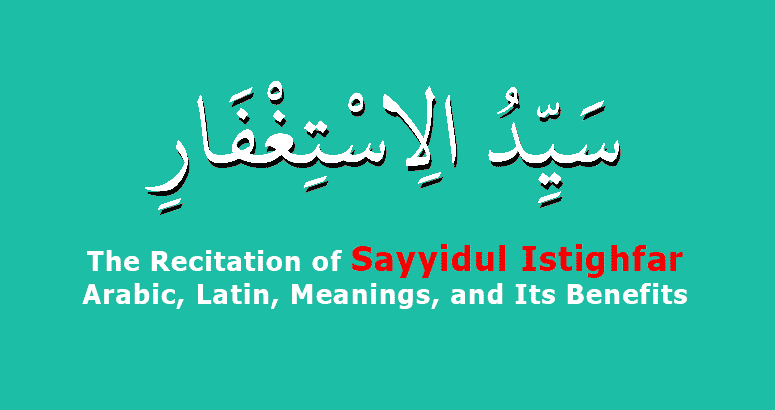Sayyidul Istighfar is a term used to refer to a specific prayer in Islam that serves as a plea for forgiveness to Allah. “Syed ul istighfar” literally means “the master of seeking forgiveness.” This term is used to describe the virtue and magnificence of this prayer.
The Sayyidul Istighfar prayer is a supplication taught by Prophet Muhammad (peace be upon him) to the Muslim community. This prayer holds great value in attaining forgiveness from Allah. The prayer consists of the Arabic text and its translation, which you have provided earlier.
The Sayyidul Istighfar prayer holds a special significance in Islam and is highly recommended to be recited by Muslims as a form of acknowledging sins, showing humility, and seeking forgiveness from Allah.
Syed ul Istighfar can be recited during the day, at night, or whenever one finds the opportunity. When recited, Sayyidul Istighfar can bring benefits to the one reciting it.
The Benefits of Reciting Sayyidul Istighfar
Sayyidul Istighfar (syed ul istighfar) is a powerful supplication in Islam that holds numerous benefits for those who recite it with conviction. According to a narration, if a person utters Sayyidul Istighfar during the daytime with unwavering faith and passes away before the evening, they will be among the inhabitants of Paradise. Similarly, if one recites this phrase during the night with firm belief and passes away before the morning, they will also be among the inhabitants of Paradise.
This beautiful supplication serves as a means of seeking forgiveness from Allah and acknowledging His absolute power and mercy. By reciting Sayyidul Istighfar, a person humbles themselves before their Creator, recognizing their dependence on Him and seeking His forgiveness for any wrongdoing or sins committed.
The significance of reciting Master Istighfar lies not only in its potential to grant entry into Paradise but also in the spiritual and psychological benefits it offers. It serves as a reminder of the importance of repentance and seeking forgiveness regularly, fostering a sense of accountability and self-reflection.
Furthermore, reciting Sayyidul Istighfar can bring peace of mind and tranquility to the heart. It acts as a source of solace, knowing that Allah is always ready to forgive those who sincerely seek His forgiveness. It instills hope and strengthens the bond between the worshipper and their Lord, providing a means of attaining spiritual purification and growth.
The Text of Sayyidul Istighfar, Arabic, Latin and Their Meanings
In this title, we provide a comprehensive overview of Syed ul istighfar by including the reading, Arabic text, Latin transliteration, and the meanings of the supplication.
This allows readers to understand and engage with the content on multiple levels, catering to both Arabic-speaking individuals and those who may be unfamiliar with the language.
Sayyidul Istighfar in Arabic

اللَّهُمَّ أَنْتَ رَبِّي،
لَا إِلٰهَ إِلَّا أَنْتَ،
خَلَقْتَنِي وَأَنَا عَبْدُكَ،
وَأَنَا عَلَىٰ عَهْدِكَ وَوَعْدِكَ مَا اسْتَطَعْتُ،
أَعُوذُ بِكَ مِنْ شَرِّ مَا صَنَعْتُ،
أَبُوءُ لَكَ بِنِعْمَتِكَ عَلَيَّ،
وَأَبُوءُ لَكَ بِذَنْبِي،
فَاغْفِرْ لِي،
فَإِنَّهُ لَا يَغْفِرُ الذُّنُوبَ إِلَّا أَنْتَ
Latin Transliteration
Allahumma anta rabbi,
la ilaha illa anta,
khalaqtani wa ana abduka,
wa ana ‘ala ‘ahdika wa wa’dika ma istata’tu.
A’udhu bika min sharri ma sana’tu,
abuu laka bini’matika ‘alayya,
wa abuu laka bidhanbi,
faghfir li,
fa innahu la yaghfiru adh-dhunuba illa anta.
English Translation
O Allah, You are my Lord. There is no god but You. You created me and I am Your servant. I abide by Your covenant and promise as best I can.
I seek refuge in You from the evil of what I have done. I acknowledge Your favor upon me, and I confess my sin to You. So forgive me, for truly none forgives sins except You.
Time and Context to Recite Sayyidul Istighfar
The best time to recite Sayyidul Istighfar — also known as Syed ul Istighfar — is during the early morning and in the evening. This is based on a narration found in Sahih al-Bukhari (6306):
“Whoever recites Sayyidul Istighfar during the day with firm belief in it, and dies before evening, he will be from the people of Paradise. And whoever recites it during the night with firm belief in it, and dies before morning, he will be from the people of Paradise.” (HR. al-Bukhari)
Thus, the preferred times are:
- After Fajr prayer (morning supplication)
- Before or after Maghrib or ‘Isha’ prayer (evening supplication)
Virtues and Rewards of Sayyidul Istighfar
Unlike generic forms of istighfar (seeking forgiveness), Sayyidul Istighfar combines tawhid, ‘ubudiyyah, and tawbah in one comprehensive statement. Its uniqueness lies in the structure:
- Acknowledgement of Allah’s oneness and lordship.
- Recognition of oneself as His servant.
- Confession of one’s sins and shortcomings.
- Plea for forgiveness and reliance on Allah’s mercy.
This makes it one of the most complete forms of repentance, highly encouraged in both daily life and moments of introspection.
Relation to Other Forms of Istighfar
Sayyidul Istighfar is not the only form of seeking forgiveness (istighfar) in Islam, but it holds a superior rank due to its authenticity and depth. Other known forms include:
- Astaghfirullah — the shortest form, highly frequent and accessible.
- Rabbighfir li wa tub ‘alayya — often recited in prayer (see QS. Al-Baqarah: 128).
- Astaghfirullah al-‘Azim alladzi la ilaha illa Huwa… — a longer form from hadith Abu Dawud and al-Tirmidhi.
These can be used interchangeably based on situation and ease. However, Sayyidul Istighfar remains one of the most comprehensive and rewarding formulations for sincere repentance.
By incorporating this supplication into their daily lives, believers can experience the transformative effects it has on their hearts, finding solace, peace, and the hope of eternal reward. May we all strive to recite Sayyidul Istighfar regularly and benefit from its profound blessings.
